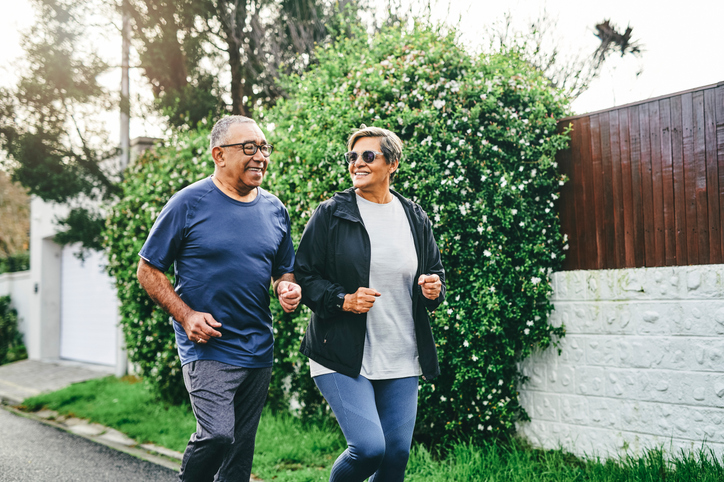Maintaining strong, healthy knees is key to preserving independence and enjoying an active lifestyle. Whether it’s taking a morning walk, tending to your garden, or keeping up with grandchildren, flexible and pain-free knees make everyday activities more enjoyable. However, as we age, knee discomfort and stiffness can become common concerns. The good news? You have the power to support your knee health with the right strategies.
This guide explores three essential ways to strengthen your knees, improve mobility, and reduce stiffness. From understanding how aging affects your joints to incorporating joint-healthy nutrition and leveraging supportive wellness resources, these tips will help you stay active for years to come.
Before making changes to your exercise or diet, consult your doctor to ensure these strategies align with your health needs.
1. Understand the Key Factors That Affect Knee Health
Aging naturally affects the body, and our knee joints are no exception. By understanding the common changes that occur, you can take proactive steps to protect and strengthen your knees.
Cartilage Breakdown
Cartilage is the smooth tissue that cushions and protects the ends of your bones. Over time, it wears down, leading to stiffness, inflammation, and discomfort. This can make standing up after sitting or walking long distances more difficult. According to Dr. Mason Harris of the Conde Center for Comprehensive Spine and Wellness, “Motion is lotion. Find something you like to do that is pain-free, and continue to move.” Activities like low-impact walking and swimming can help keep your joints moving and reduce stiffness.
Muscle Weakness (Sarcopenia)
Muscles surrounding the knee provide essential support, but aging can lead to muscle loss, placing extra stress on the joint. Strong quadriceps and hamstrings help stabilize the knee and reduce pain when climbing stairs or getting up from a chair. Dr. Harris emphasizes, “The body likes movement. The joints move better as we walk, stretch, and bend.” Regular strength-building exercises help counteract muscle loss and improve knee stability.
Bone Density Loss
Bone density declines with age, increasing the risk of fractures and reducing knee stability. Weak bones contribute to poor alignment, discomfort, and mobility issues. Engaging in weight-bearing exercises, such as walking or resistance training, and ensuring adequate calcium and vitamin D intake are key to maintaining strong bones.
Loss of Flexibility
As we age, our tendons and ligaments lose elasticity, making it harder to bend and stretch without discomfort. Regular stretching helps prevent stiffness and improves mobility. Dr. Harris suggests, “Find something you look forward to. That’s really how we need to change [our] mindset.” Whether it’s yoga, tai chi, or simple knee stretches, prioritizing flexibility can enhance movement and reduce pain.
2. Eat for Joint Health
The right nutrition can support knee health by reducing inflammation, preserving cartilage, and strengthening bones. A well-balanced diet can also help manage weight, which plays a crucial role in reducing stress on the knees.
Incorporate these key changes into your diet:
- Omega-3 Rich Foods (Salmon, Flaxseeds, Walnuts) – Omega-3 fatty acids help reduce inflammation and keep joints lubricated.
- Antioxidant-Packed Foods (Berries, Leafy Greens, Citrus Fruits) – Antioxidants protect cartilage from oxidative stress and support collagen production.
- Vitamins C and D for Collagen and Bone Health – Vitamin C aids in collagen synthesis, while vitamin D enhances calcium absorption.
- Calcium and Vitamin K for Bone Strength (Dairy, Leafy Greens, Fortified Foods) – These nutrients are essential for maintaining strong bones and preventing fractures.
- Hydration for Joint Lubrication – Drinking plenty of water helps maintain cartilage integrity and keeps joints moving smoothly.
- Foods to Limit (Processed Foods, Sugary Drinks, Excessive Red Meat) – These can contribute to inflammation and joint discomfort.
Making simple dietary changes can have a profound impact on how your knees feel. A well-balanced diet combined with an active lifestyle helps create the foundation for long-term joint health and overall well-being.
3. Leverage Supportive Resources for Knee Health
Supporting knee health isn’t just about what you do on your own—it’s also about taking advantage of expert resources and community programs. Leveraging these tools can make a significant difference in maintaining mobility and reducing discomfort.
- Consulting Physical Therapists – A physical therapist can design a personalized knee-strengthening program to help you maintain mobility and prevent injuries.
- Using Supportive Footwear and Assistive Devices – Properly fitted shoes and orthotic inserts can provide extra joint support, while braces and walking aids help reduce knee strain.
- Participating in Community Fitness Programs – Group exercise classes tailored for seniors, such as aqua aerobics and tai chi, can help you stay active while minimizing joint stress.
Taking advantage of these resources can empower you to stay mobile, maintain independence, and continue enjoying an active lifestyle.
Experience Wellness at GreenFields of Geneva
At GreenFields of Geneva, we understand the importance of staying active and engaged. Our community offers a variety of wellness programs, from group fitness classes to on-site physical therapy services, all designed to help you maintain healthy joints and overall well-being. Whether it’s walking on scenic trails, strengthening your knees with expert-led exercises, or enjoying nutritious chef-inspired meals, GreenFields provides the support you need to thrive.
Prioritize your knee health and keep moving with confidence. Contact us today to learn more about our wellness programs or schedule a tour to experience all that GreenFields of Geneva has to offer.
By making small adjustments today, you can support your knees for years to come. Keep moving, stay strong, and embrace all the activities you love.



